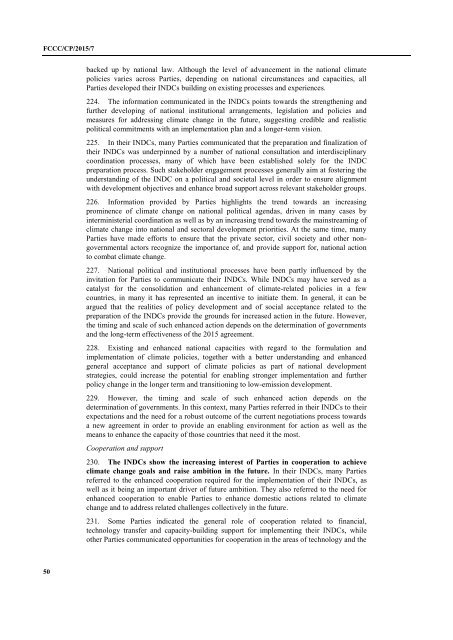FCCC/CP/2015/7
1PYuHQM
1PYuHQM
You also want an ePaper? Increase the reach of your titles
YUMPU automatically turns print PDFs into web optimized ePapers that Google loves.
<strong>FCCC</strong>/<strong>CP</strong>/<strong>2015</strong>/7<br />
backed up by national law. Although the level of advancement in the national climate<br />
policies varies across Parties, depending on national circumstances and capacities, all<br />
Parties developed their INDCs building on existing processes and experiences.<br />
224. The information communicated in the INDCs points towards the strengthening and<br />
further developing of national institutional arrangements, legislation and policies and<br />
measures for addressing climate change in the future, suggesting credible and realistic<br />
political commitments with an implementation plan and a longer-term vision.<br />
225. In their INDCs, many Parties communicated that the preparation and finalization of<br />
their INDCs was underpinned by a number of national consultation and interdisciplinary<br />
coordination processes, many of which have been established solely for the INDC<br />
preparation process. Such stakeholder engagement processes generally aim at fostering the<br />
understanding of the INDC on a political and societal level in order to ensure alignment<br />
with development objectives and enhance broad support across relevant stakeholder groups.<br />
226. Information provided by Parties highlights the trend towards an increasing<br />
prominence of climate change on national political agendas, driven in many cases by<br />
interministerial coordination as well as by an increasing trend towards the mainstreaming of<br />
climate change into national and sectoral development priorities. At the same time, many<br />
Parties have made efforts to ensure that the private sector, civil society and other nongovernmental<br />
actors recognize the importance of, and provide support for, national action<br />
to combat climate change.<br />
227. National political and institutional processes have been partly influenced by the<br />
invitation for Parties to communicate their INDCs. While INDCs may have served as a<br />
catalyst for the consolidation and enhancement of climate-related policies in a few<br />
countries, in many it has represented an incentive to initiate them. In general, it can be<br />
argued that the realities of policy development and of social acceptance related to the<br />
preparation of the INDCs provide the grounds for increased action in the future. However,<br />
the timing and scale of such enhanced action depends on the determination of governments<br />
and the long-term effectiveness of the <strong>2015</strong> agreement.<br />
228. Existing and enhanced national capacities with regard to the formulation and<br />
implementation of climate policies, together with a better understanding and enhanced<br />
general acceptance and support of climate policies as part of national development<br />
strategies, could increase the potential for enabling stronger implementation and further<br />
policy change in the longer term and transitioning to low-emission development.<br />
229. However, the timing and scale of such enhanced action depends on the<br />
determination of governments. In this context, many Parties referred in their INDCs to their<br />
expectations and the need for a robust outcome of the current negotiations process towards<br />
a new agreement in order to provide an enabling environment for action as well as the<br />
means to enhance the capacity of those countries that need it the most.<br />
Cooperation and support<br />
230. The INDCs show the increasing interest of Parties in cooperation to achieve<br />
climate change goals and raise ambition in the future. In their INDCs, many Parties<br />
referred to the enhanced cooperation required for the implementation of their INDCs, as<br />
well as it being an important driver of future ambition. They also referred to the need for<br />
enhanced cooperation to enable Parties to enhance domestic actions related to climate<br />
change and to address related challenges collectively in the future.<br />
231. Some Parties indicated the general role of cooperation related to financial,<br />
technology transfer and capacity-building support for implementing their INDCs, while<br />
other Parties communicated opportunities for cooperation in the areas of technology and the<br />
50


